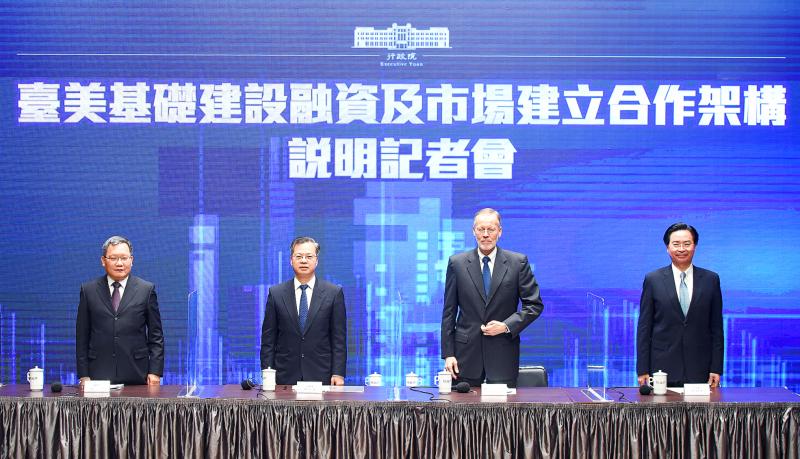Taiwan and the US are to collaborate on infrastructure funding in Asia and Latin America, which would boost Taiwan’s clout in the international community, Minister of Finance Su Jain-rong (蘇建榮) said yesterday.
The Framework to Strengthen Infrastructure, Finance and Market Cooperation, alongside the New Southbound Policy and the US’ Indo-Pacific strategy, would allow Taiwan to initiate dialogue with more friendly countries in the region, while allowing Taiwanese firms to branch out into regional debt markets, Su said.
The Ministry of Economic Affairs, the Ministry of Finance, the Ministry of Transportation and Communications, and the Financial Supervisory Commission would be in charge of four task forces with direct access to the US, he said.

Photo: Liao Chen-huei, Taipei Times
Taiwan has extensive business interactions with Southeast Asian countries such as Vietnam and Thailand, and nine of the remaining 15 countries that officially recognize its government are in Latin America or the Caribbean.
Su said that a memorandum of understanding — signed on Sept. 17 — for the framework was a “new model to deepen ties.”
As stipulated by the framework, the Ministry of Finance and the US Department of the Treasury are to establish the task forces to facilitate collaborative projects for infrastructure — government and private — via investment.
American Institute in Taiwan Director Brent Christensen said that experts would meet this fall to discuss how to promote the restructuring of regional supply chains.
US clients have been a driving force in the relocation of supply chains composed of Taiwanese-owned technology and household appliance businesses back to Taiwan from China, Christensen said.
Minister of Foreign Affairs Joseph Wu (吳釗燮) said that the framework has symbolically taken Taiwan-US relations to another level.
Both sides would continue to explore possible avenues of collaboration, Wu said.
National Development Council (NDC) Minister Kung Ming-hsin (龔明鑫) said that the framework’s signing shows that Taiwan is more capable and confident of making contributions in the international community and that the nation would strive to make the most of its contributions in regional construction efforts.
Presidential Office spokesman Xavier Chang (張惇涵) said that the framework, on top of a delegation headed by US Undersecretary of State for Economic Growth, Energy and the Environment Keith Krach that visited Taiwan from Sept. 17 to 20, showed that the Taiwan-US relationship was advancing to another level.
Whether it is for national development or to fulfill Taiwan’s obligations as a member of the international community, the nation must have more significant participation in global affairs, Chang said, adding that this includes ongoing collaborations with the US in the Indo-Pacific region.
Chang attributed the framework and Krach’s visit to the government’s diplomacy strategy, adding that the government was moving forward one step at a time.
Taiwan would continue to deepen collaborations with the US on all fronts and industries, and attempt to create mutually beneficial scenarios, Chang said.

MAKING WAVES: China’s maritime militia could become a nontraditional threat in war, clogging up shipping lanes to prevent US or Japanese intervention, a report said About 1,900 Chinese ships flying flags of convenience and fishing vessels that participated in China’s military exercises around Taiwan last month and in January have been listed for monitoring, Coast Guard Administration (CGA) Deputy Director-General Hsieh Ching-chin (謝慶欽) said yesterday. Following amendments to the Commercial Port Act (商港法) and the Law of Ships (船舶法) last month, the CGA can designate possible berthing areas or deny ports of call for vessels suspected of loitering around areas where undersea cables can be accessed, Oceans Affairs Council Minister Kuan Bi-ling (管碧玲) said. The list of suspected ships, originally 300, had risen to about 1,900 as

Japan’s strategic alliance with the US would collapse if Tokyo were to turn away from a conflict in Taiwan, Japanese Prime Minister Sanae Takaichi said yesterday, but distanced herself from previous comments that suggested a possible military response in such an event. Takaichi expressed her latest views on a nationally broadcast TV program late on Monday, where an opposition party leader criticized her for igniting tensions with China with the earlier remarks. Ties between Japan and China have sunk to the worst level in years after Takaichi said in November that a hypothetical Chinese attack on Taiwan could bring about a Japanese

Right-wing political scientist Laura Fernandez on Sunday won Costa Rica’s presidential election by a landslide, after promising to crack down on rising violence linked to the cocaine trade. Fernandez’s nearest rival, economist Alvaro Ramos, conceded defeat as results showed the ruling party far exceeding the threshold of 40 percent needed to avoid a runoff. With 94 percent of polling stations counted, the political heir of outgoing Costa Rican President Rodrigo Chaves had captured 48.3 percent of the vote compared with Ramos’ 33.4 percent, the Supreme Electoral Tribunal said. As soon as the first results were announced, members of Fernandez’s Sovereign People’s Party

MORE RESPONSIBILITY: Draftees would be expected to fight alongside professional soldiers, likely requiring the transformation of some training brigades into combat units The armed forces are to start incorporating new conscripts into combined arms brigades this year to enhance combat readiness, the Executive Yuan’s latest policy report said. The new policy would affect Taiwanese men entering the military for their compulsory service, which was extended to one year under reforms by then-president Tsai Ing-wen (蔡英文) in 2022. The conscripts would be trained to operate machine guns, uncrewed aerial vehicles, anti-tank guided missile launchers and Stinger air defense systems, the report said, adding that the basic training would be lengthened to eight weeks. After basic training, conscripts would be sorted into infantry battalions that would take